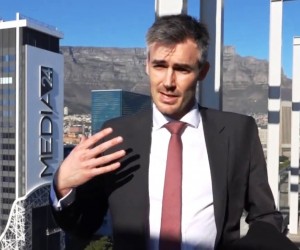Exports from the Western Cape totalled R74.87 billion in 2013, an increase of 16%, while Western Cape ports – including Cape Town, Saldanha and Mossel Bay – handle 20 to 30% of the cargo in South Africa (SA).
Tim Harris, CEO of Wesgro welcomed the Transnet National Ports Authority (TNPA) announcement to strengthen the Cape’s position as a key business destination in Africa. Describing ports as levers of growth, Harris acknowledged the TNPA’s collaborative approach with the private sector to help establish the region as a major transport and logistics hub. In speaking of the potential, he said: “Already, 54 out of 98 of the multi-national companies that have invested in Cape Town have done so to access the African market”.
To find out more about business in the Western Cape, Gregory Simpson caught up with the charismatic Harris.
Saldanha is a big growth area with the oil and gas offshore starting to really pick up steam, how big can that area become?
That can be a significant contributor to the regional economy but it requires a lot of infrastructure to get built and it requires much bigger skills and a pipeline to be developed. The team working on developing the infrastructure is a collaborative effort between the DTI, IDC, Transnet, the provincial government and the municipality of Saldanha. It’s a complex collaborative effort, but during the times that I’ve spent with them everybody has the same ambition, which is to build the best oil service in Africa at Saldanha, so I’m confident with that vision and with effective collaboration it can become a reality.
You talk about getting things done in Cape Town, what are the keys to getting things done in a developing economy?
The key to getting things done in Cape Town is boosting our connectivity with the rest of our region. Our market in Cape Town and in the Western Cape is certainly not that interesting to investors, it’s a relatively small market, but if you can credibly come to Cape Town and supply the broader African market from here. I think that’s an incredibly exciting vision for Cape Town, so whatever we can do to boost connectivity through road freights, through air links and through sea freights the more we can do that, the more we can move closer to the vision of a dynamic hub for the continent.
A lot of different players at stake here, how do you bring everybody together for the common good?
That’s one of the benefits of having an entity like Wesgro in the system; we are co-funded by the City of Cape Town and the Province of the Western Cape. We sit apart from those governments and we’re able to bring in other players to collaborate in a space. For example, on air access we’re working together with the Airports Company South Africa, the City of Cape Town, and the provincial governments as a joint team to try and develop more routes into and out of Cape Town International Airport.
Can you talk a bit about the expansion of the airport, what that means to the City and the big talking point is the non-stop flight?
We really need to see that runway realigned and expanded to be able to accommodate the A380’s. It’s the future of aviation being able to land those larger planes, and we simply need to be able to accommodate them, so I hope that process gets underway soon and we are able to introduce that additional capacity. In terms of flights, I talk about the region as an economic hub, the truth is we’re not well enough connected with direct flights to the rest of the continent, so the addition of the Ethiopia routes yesterday from Addis is a very exciting development, it opens up a direct line into one of the fastest growing markets, one of the largest markets in Africa. There are many opportunities for Western Cape companies to expand into Ethiopia, to trade more in the country and to hopefully welcome more Ethiopian tourists.
And Angola is another hot topic, how are we going to make the most of that relationship?
Angola is an interesting one – that’s probably the city on the continent that we’re best connected to after Jo’burg. We have direct flights three times a week, the sea freight route is well established and road freight. The guys are getting containers from Cape Town to Luanda in ten days, so we have a strong connectivity – the interesting opportunity in Angola now is what they do to diversify out of oil. They’re far too dependent on oil and they’ve realised that now, with the effects on their budget from the collapse of the oil price, they are very focused on diversifying and they are particularly focused on sectors like agri-processing and tourism infrastructure. The biggest companies in that space are in the Western Cape and we have been working with the government and the City of Cape Town and the province to get some of those companies into the market – this as an expansion opportunity to increase the size of their operation and run out of the Western Cape.
Absolutely, and private enterprises are obviously keen to make this whole thing work?
We took a mission two months ago to Angola, 15 companies including KWV and Parmalat, some of the real regional champions and those companies are able to move quickly, they are able to spend quickly and hopefully they see themselves as able to do a dramatic expansion across the continent from Cape Town.
Transnet just bought 240 new locos, how is that going to affect growth projections?
It’s also an idea that’s been a long time coming and I’m glad there’s been progress now. The rail infrastructure of the country is an incredibly cost efficient way to handle distribution, and they had a rolling stock problem for a long time so hopefully those procurements and the introduction of this new rolling stock is going to get things going on the rail again.
And looking into the crystal ball five, ten years down the line what’s going to be the key drive to take the hub away from Johannesburg and into Cape Town?
I don’t think we want to take it away from Jo’burg, Jo’burg will always be a hub, and we just want to get into that gap. Right now many companies choose to run their African operations out of Dubai or out of Jo’burg, we want it to be a three way choice, we want there to be a credible offer for Cape Town, saying we’ve got companies now running African operations from here. They’re able to connect to their markets easily through road, sea and air and we can leverage some of the lifestyle benefits of our city seen in the quality of the infrastructure benefits. Increasingly we want to get companies saying – I really want to live in Cape Town and I’m able to run a big global operation from the city.
What I like about the Singaporean example is it’s about how a city can overcome constraints. I mean no one had more constraints than Singapore 50 years ago, they had no land, they had very few people, they weren’t connected to markets, they were an extremely poor economy and 50 years later they are one of the wealthiest economies in the world. They took those constraints and turned them into opportunities, so it’s an inspiring vision for a city like Cape Town which has its own share of constraints. If Singapore could overcome theirs then we can overcome ours.
The green economy is another big talking point, I hear George Airport is going solar, are there plans to integrate that into your business plan?
The energy needs are driving investments, 75% of our investment that Wesgro brought into the region last year was in renewables, in green energy, so the market is responding to that, as we develop a special economic zone in Atlantis and focus on green energy. I think we’re going to see that accelerate and in the future we’re going to have a very strong renewable sector in Cape Town, possibly the leading city on the continent for renewables.
Road tolls have been a big talking point. Is that going to be a reality in Cape Town or is it something we can do without?
We will have to see what happens on that front and respond when it happens, I wouldn’t want to speculate. Certainly we wouldn’t want a situation like we saw in Jo’burg with E-tolls but at the same time we need to make sure that our infrastructure expands to facilitate the growth we need. Somewhere between those two objectives you have to find a happy medium and I hope that the city and the province will be able to find that happy medium together with national government and the roads authority.
How does SA rate in terms of red-tape compared to overseas competition?
What I did was compare SA to some of the countries we’re competing with and clearly when you look at the BRICS we are better on red tape, we are better on business efficiency but of course we’re not just competing with the BRICS. There are a lot of other countries we are competing with who run much more efficient systems with much less red tape, so there’s a lot to do, but what I wanted to get across today is perhaps that it’s not as bleak as you might think and we have a lot to work with here.
Gregory Simpson
PULL QUOTE: “Saldanha can be a real significant contributor to the regional economy but it requires a lot of infrastructure to get built and it requires much bigger skills”.










